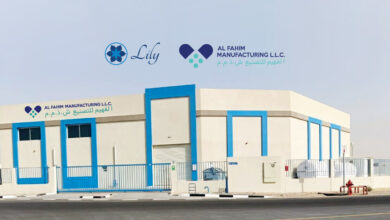Wiping out infection
How GAMA Healthcare is changing the way we tackle antibiotic resistance and healthcare-associated infections

In the Arab world, more than 1 in 10 acute healthcare patients has a healthcare-associated infection (HAI). HAIs cause poor patient outcomes, increase the length of hospital stays and place a huge burden on healthcare resources. With antibiotic resistance on the rise, we need to find better ways to stop the spread of infection within our hospitals.
A universal solution
It’s 2004. Healthcare-associated methicillin resistant Staphylococcus aureus (MRSA) infections are making headlines. The public worry about the spread of “superbugs,” antibiotic-resistant organisms, spreading through hospitals. Colonised patients, contaminated surfaces and poor hand hygiene are all implicated in recurrent outbreaks across the globe.
Meanwhile, in the UK, two doctors working in the NHS notice a seemingly small problem: their stethoscopes would touch each of their patients, but there wasn’t an easy way to effectively clean them between patients on busy wards.
At the time, cleaning and disinfection were two different and separate processes. You had to clean a surface first using detergent, wait for it to dry and then disinfect using alcohol or chlorine. Because of the number of steps involved, staff would often overlook one of the steps in this process in favour of other patient care.
That simple observation triggered questions in the minds of doctors Guy Braverman and Allen Hanouka. Was it possible to change the way cleaning and disinfection were done? Could an innovation help make things easier for healthcare professionals? Would that help protect their patients from the spread of infection?
Why surface disinfection matters
It’s not just stethoscopes; any surface can play an important (but often overlooked) role in transmission of microorganisms. When healthcare workers touch surfaces in the patient’s environment, they’re just as likely to pick up harmful microorganisms on their hands than if they touched the patient directly.
From there, bacteria, viruses and other pathogens can be unwittingly spread from patient to patient. Many pathogens can survive on surfaces for an extended period of time (hours, days or even months).
Clinically proven
Guy and Allen soon founded GAMA Healthcare and introduced the world to their Clinell Universal Wipes. Clinell Universal Wipes were the first wipe to clean and disinfect in a single step. By combining the processes and making cleaning and disinfection easier, Guy and Allen hoped it would improve the chance of staff complying, reduce contamination in the environment and, in turn reduce the risk of infections spreading. Their formulation used a blend of disinfectants to provide efficacy against a broad range of microorganisms an stop organisms from forming resistance. Unlike other disinfectants, Clinell Universal Wipes were effective in dirty conditions and with very short contact times – making sure the lab-reported efficacy data would actually be reflective of real-world performance.
Infection prevention specialists
Over seventeen years later, GAMA Healthcare products are now available in over 70 countries and Clinell Universal Wipes are used by 9 out 10 NHS hospitals. Clinell Universal Wipes have proven efficacy against viruses, bacteria, and fungal pathogens. They’ve been used throughout the Arab world to help fight MERS, COVID-19 and other infections.
Today, with Guy and Allen still at the helm, GAMA Healthcare is a world-leading infection prevention company. They focus on innovative infection prevention solutions in surface disinfection, skin hygiene and patient isolation.
Those original questions still underpin all their products: what innovations could help protect people and patients from the spread of infection?















